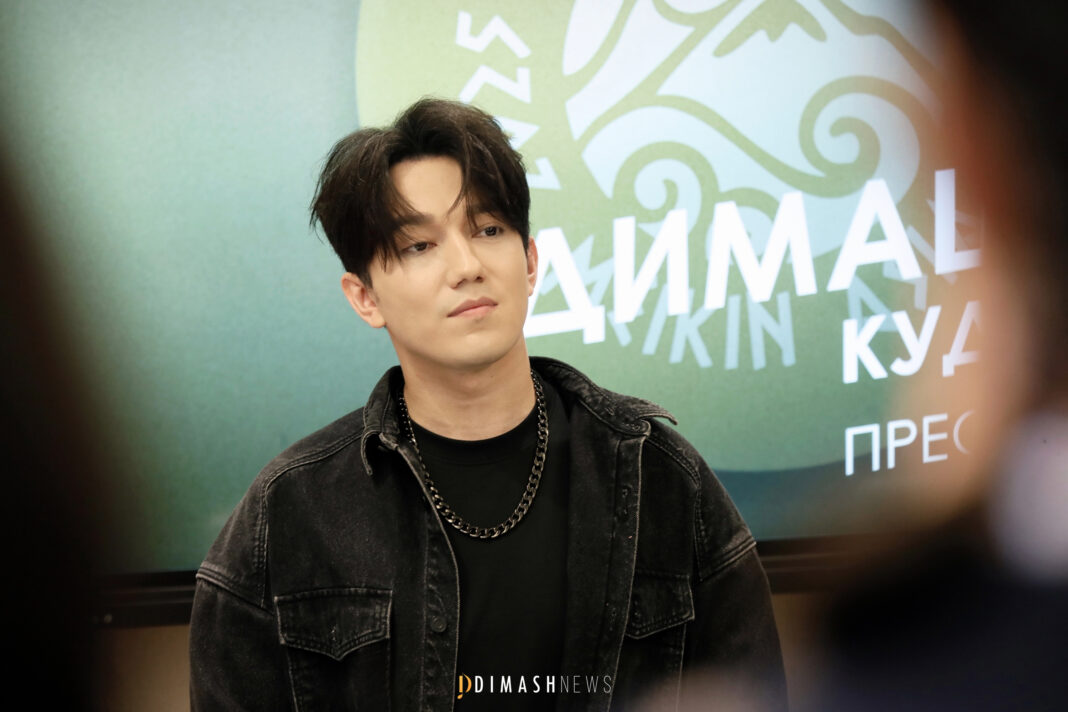On July 23, the day after the closing of the 4th International Music Festival “Meikin Asia,” Dimash Qudaibergen held a press conference in Cholpon-Ata, where he answered questions from journalists about being awarded the title of People’s Artist of the Kyrgyz Republic, the importance of academic musical education, his thoughts on online hate, and much more.
“Dear friends, dear guests, thank you sincerely for taking the time to be here, for your attention and respect. I am ready to answer all your questions and will try to make this a meaningful interview,” Dimash greeted the media representatives.
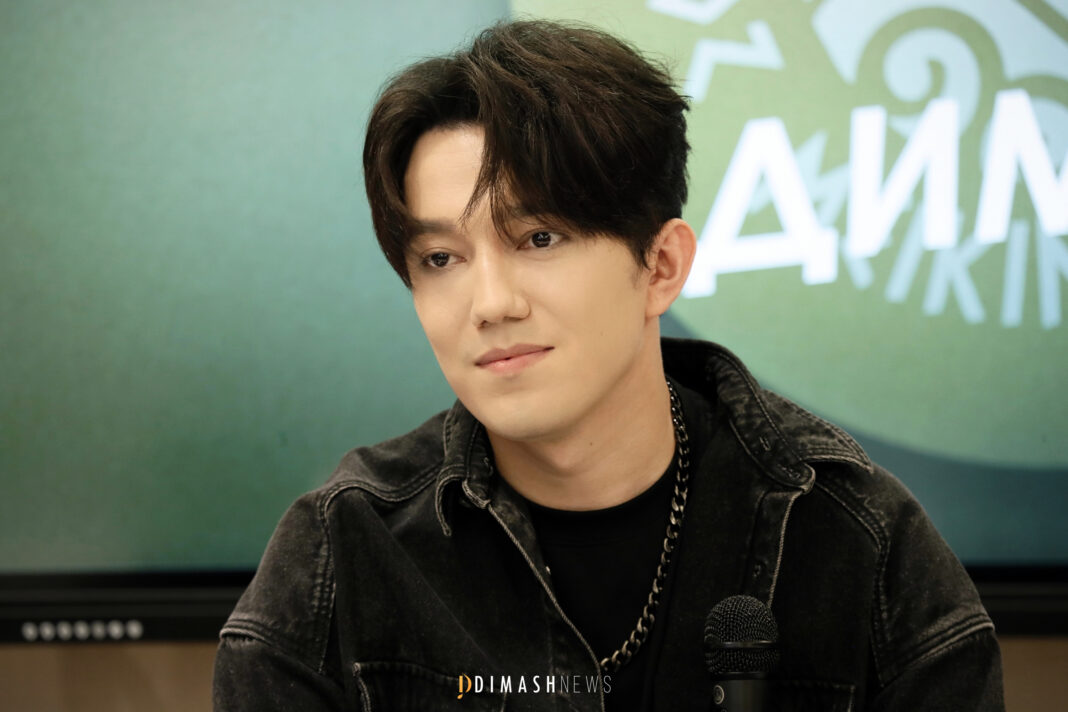 What does the title of People’s Artist of the Kyrgyz Republic mean to you?
What does the title of People’s Artist of the Kyrgyz Republic mean to you?
Thank you very much for the question. Let me take this opportunity to sincerely thank President Sadyr Japarov. There is a saying in Kazakh that goes, “There is benefit in everything.” The award I received yesterday felt to me like a sign of fraternal respect from the Kyrgyz people to the Kazakh people. So I cannot say this award belongs to me alone. I want to sincerely thank you all for your hospitality, for your attention, and for your deep and genuine love for our art and our culture.
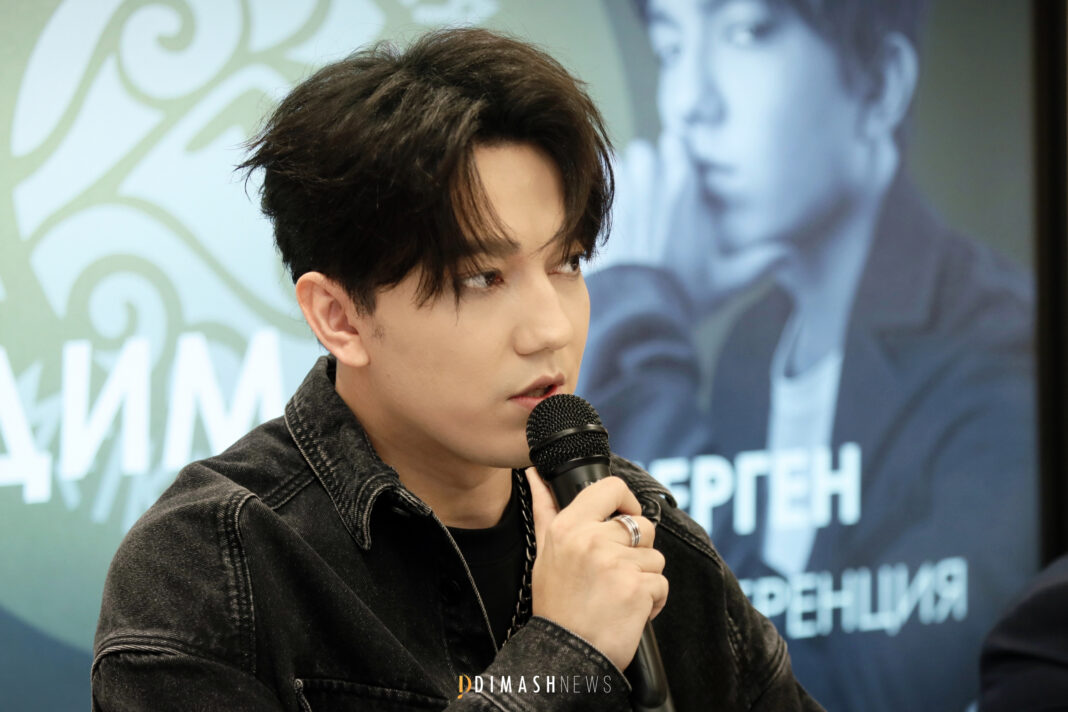
When can we expect a full concert from you in Kyrgyzstan?
Of course I would really love to perform a concert here. But since I am currently on a world tour that is scheduled many months, almost a year in advance, I think I will be able to bring the next program here.
What upcoming projects do you have with Igor Krutoy?
I have great respect for Igor Yakovlevich. He has written many hit songs, and it is a huge honor for me to have his compositions in my repertoire. Right now, I have many projects with other producers and composers, so at the moment we are taking a creative pause. Even though some people think we had a falling out, that is not true at all. We are still on very good terms. I am a performer, and he is a composer.
I am currently working with other composers. For example, I recently released the song “Love’s Not Over Yet,” written by the legendary composer and multiple Grammy winner Walter Afanasieff, known for masterpieces like “All I Want for Christmas Is You” by Mariah Carey and “My Heart Will Go On,” which he produced. There will be more news soon and I will be happy to share it.
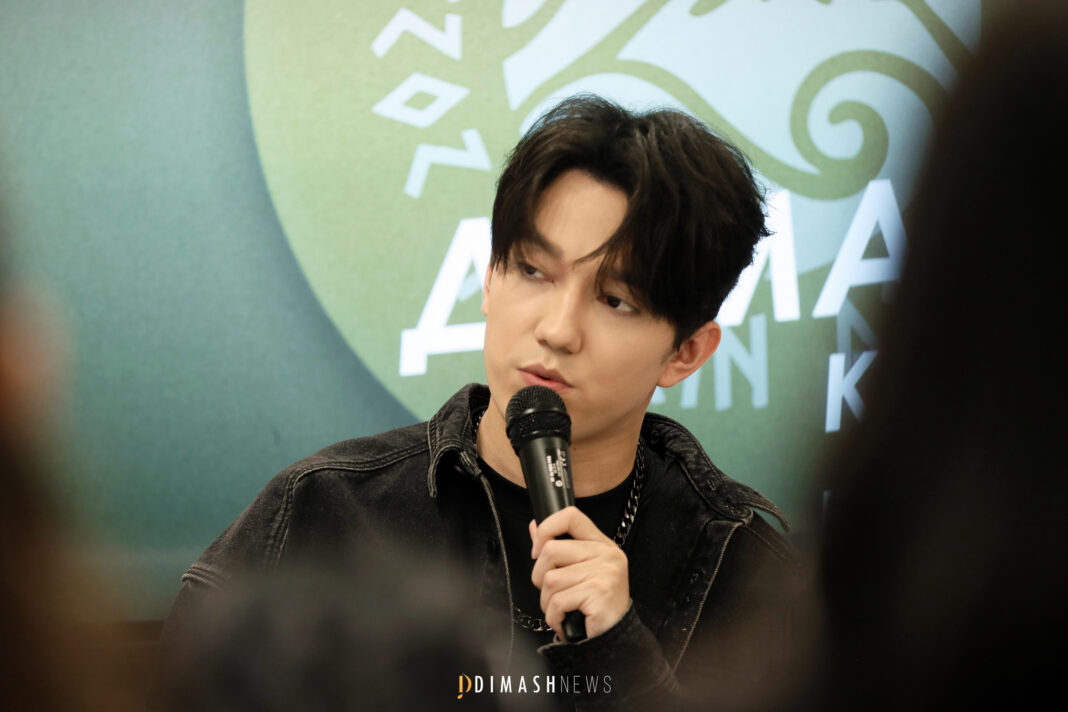
Today our dream came true — we finally met you again. What is your dream?
My biggest dream — and maybe this sounds like a slogan, but it is truly sincere — is peace. Peace and harmony in the world. A day when children no longer cry. That dream still lives in my heart. So let us, all of us adults, show sincere love, mutual understanding, and support to each other. Let us never allow hatred between our peoples.
As I said on stage yesterday, I personally want to support diplomatic relations between countries. As a singer and cultural figure, I want to actively participate in cultural diplomacy. Why? Because if there is someone from the Kyrgyz side spreading negativity, then it is up to the Kyrgyz people to stop that. And if it comes from the Kazakh side, then we as Kazakhs must take responsibility.
I hope the Kazakh people will feel the pain of the Kyrgyz people, and the Kyrgyz will feel the pain of the Kazakhs. I hope the Kyrgyz people will share in the joy of Kazakhs, and Kazakhs in the joy of Kyrgyz people. May our peoples lift each other up in solidarity, and may there be many more days like this.
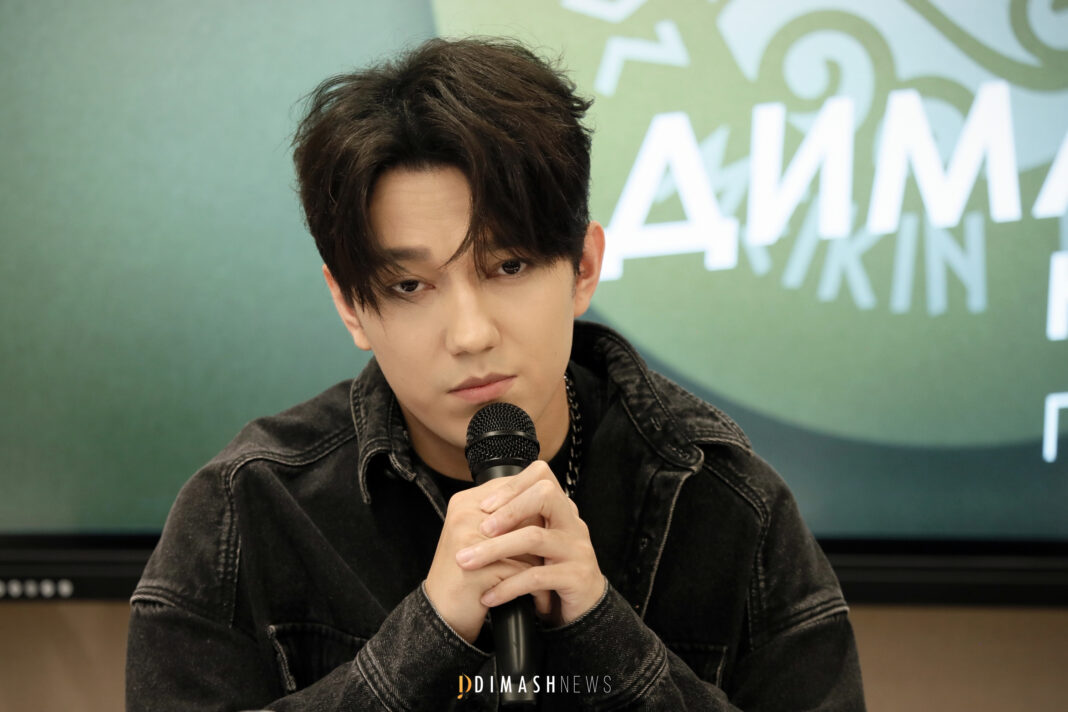
You sing in many languages. If given the chance, what would you sing in Kyrgyz, and with which singer?
Right now I do not have specific plans to collaborate with Kyrgyz artists, but I know the Kyrgyz people are very talented. I am familiar with music that has been passed down through the ages. I love studying and going deep into it. As a singer, I have been receiving education and working in music for 26 years now, and I try to stay informed from all sides. There is one piece in the Kyrgyz language that I especially love – it is called “Kuydum chok.”
How would you describe Kyrgyzstan?
Kyrgyzstan is, first and foremost, our brother given by God. Our closest neighbor. Overall, there is very little difference between Kazakhs and Kyrgyz people. We come from the same roots. If you imagine our nations as members of one family, we are like two brothers born of the same parents. Just like me and my real brother Mansur. In the same way that I love the Kazakh people for their best qualities, I see those same qualities in the Kyrgyz people – and I love them for that.
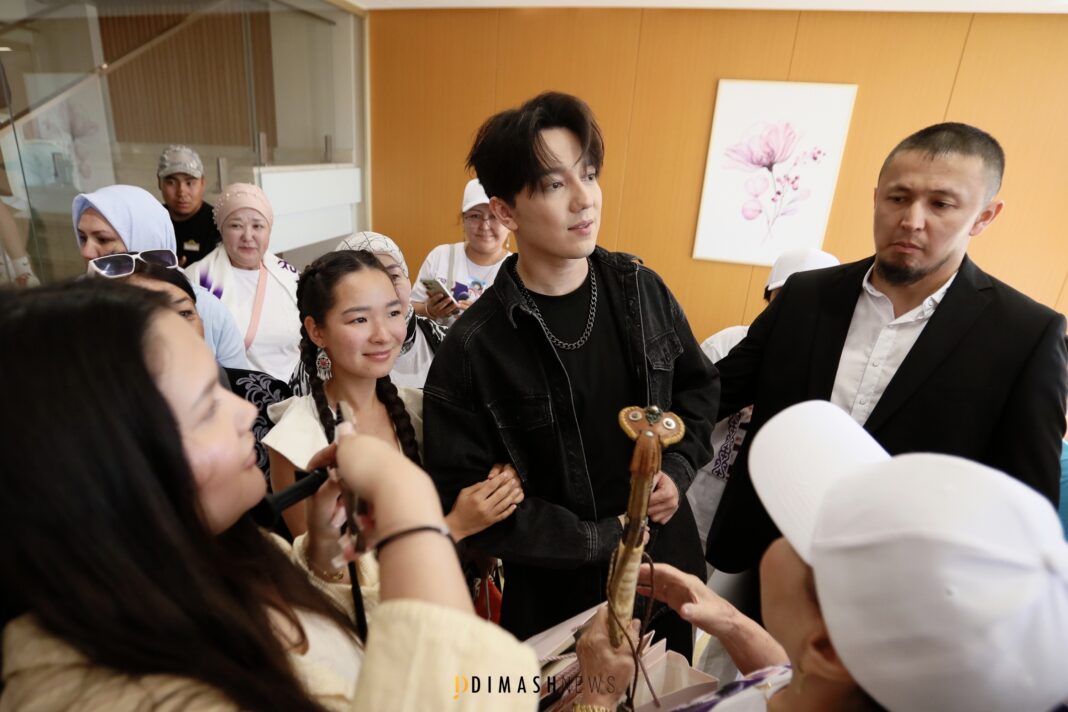
This festival is one of the first international competitions you ever won. What role does “Meikin Asia” play in your career?
It was not my first, but definitely one of the early competitions I participated in during my youth. As many already know, my international recognition really began with the Chinese show “Singer” in 2017, followed by “The World’s Best” on CBS in the United States. But before those shows, there were other projects that shaped me, gave me confidence, and inspired my journey. “Meikin Asia” stands out especially among them.
I believe this competition played a huge role in building the confident Dimash you see today. So I can confidently say that “Meikin Asia” had a tremendous impact on my development. For the support you gave to 18 or 19-year-old Dimash back then, I thank you a thousand times, dear people of Kyrgyzstan.
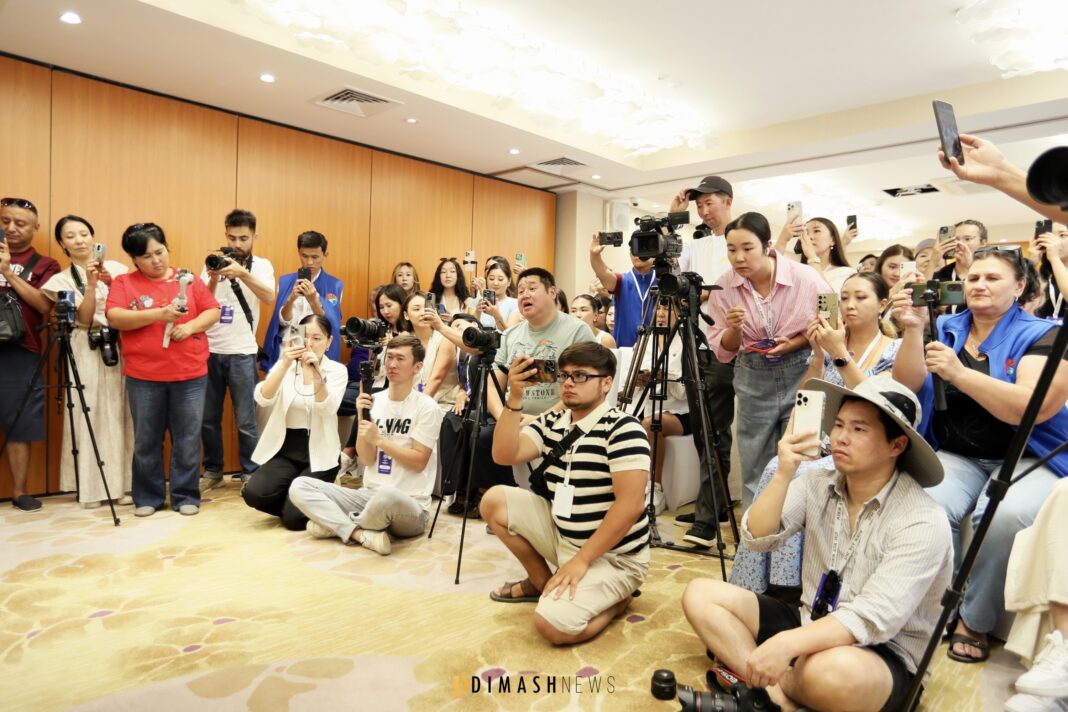
You were awarded the title of People’s Artist of Kyrgyzstan yesterday. Some on Instagram asked why you received this if you do not sing in Kyrgyz. What would you say to the haters?
Honestly, I love the haters. I really do. They inspire me. They light a fire in me. And to be fair, there is some truth in what they say. But I believe I am a reasonably self-aware person, and I understand that this award was given not just because I sing or because the local public knows me. First and foremost, it was a symbol of friendship between our nations.
How would you like to be remembered after your passing?
That is a very thoughtful question. I would like to be remembered simply as a person who performed well.
A question from your fan club. What would you like to say to your fans?
From the bottom of my heart, thank you. It is because of listeners like you that the music of a Kazakh boy named Dimash is spreading across the world. Every prestigious award I receive is directly tied to your support. I wish you health and happiness. Thank you a thousand times.
What advice would you give to the younger generation of artists and children?
I sincerely wish our younger brothers and sisters strength. May your wings never grow tired, and may you always move forward toward your goals and dreams. Life can be full of difficult and confusing moments. Everyone has a different path. Some people have an easier road, while others are given time by fate to gain experience. So I wish you strength, perseverance, and confidence as you move toward a bright future and the big, beautiful stages. Be strong. Work hard.
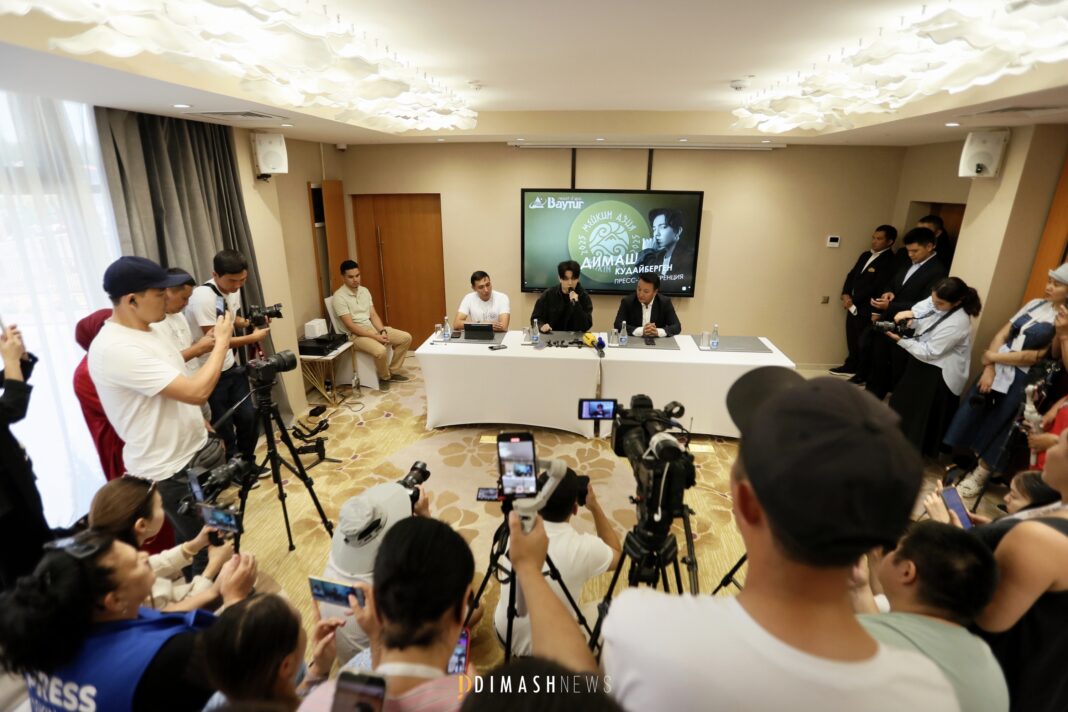
What do festivals like “Meikin Asia” offer young performers?
First, they offer invaluable experience performing live. It is a great privilege to present yourself and your culture on big stages alongside famous artists. I had that opportunity when I was 19, and it made me more confident and more ambitious. These festivals help young artists grow and move forward. Many young artists do not have managers or mentors, so they need places like this to be seen. If a young performer gives 100 percent, many new opportunities can follow. One appearance can lead to another, and so on.
Were you aware that a contestant from Kazakhstan performed your songs “Daididau” and “SOS d’un terrien en détresse”? How did you choose the songs you performed at the closing ceremony?
It would not be honest to say I knew beforehand, but I heard about it. Right before going on stage, I heard there was a participant from Kazakhstan singing two songs from my repertoire. Unfortunately, I did not get a chance to meet him. Before going on stage, I usually try to speak less and conserve energy, so we could not connect. As for the songs, this was not my solo concert — I was just one of the performers. I performed five or six songs. I want to once again thank the President for the honor. It was a joyful and emotional moment for me.
At what age did you start singing, and what inspired you to pursue music education?
I started around the age of four or five. I want to take this moment to thank my mother. Actually, she is my grandmother, but in Kazakh culture, the eldest child is often raised by the grandparents, so I have always called them Mom and Dad. My mom suffered from arthritis and could not stand for more than a minute at a time. Despite this, she would walk or take the bus to bring me to music school, where I studied piano, vocals, solfeggio, and choir. That was 26 years ago. So I have been studying music for 26 years without pause.
As for academic singing, I believe every artist, regardless of their field, should receive academic training. Academic singing, breath control, and technique are the foundation of all vocal performance. Even if you want to do pop or jazz later, everything starts from the classical base. “Pop singing” is not a real technical category. Even if you shift to other styles later, you will still need to adjust your technique and vocal placement, but the foundation must be academic. The same goes for dance. Whether it is street or traditional, you need a classical base — all the ballet foundations and more.
There is a misconception that I am purely a classical or opera singer. Yes, I sing opera arias and romances with Placido Domingo, José Carreras, and others. But come to my concerts, and you will hear that I perform across many genres. I do not place myself in any single category. I suppose I represent the genre of neoclassicism — a fusion of classical vocal technique with various musical styles.
You are known as a humble person. What kind of motivation would you give today’s youth?
I would not say I am especially humble. I am just an average person. I feel joy when I am happy, I feel sorrow when I am sad, and I can feel anger like anyone else. All the qualities found in ordinary people are in me as well — we are all human. But I do think humility is one of the greatest virtues. It should be present in people with high consciousness, broad perspective, and spiritual depth.
If you want to be among such people or move in that direction, then I believe it is important to strive for humility. Our grandfather always told us that. By grandfather I mean my father’s father. He passed away last year, not long ago. He named me Dinmukhammed, hoping I would follow the example of Dinmukhamed Kunayev, to resemble him spiritually, and to try to be like him. He always spoke of him as a role model and a great person.
Finally, you were asked about your upcoming concert in New York.
Let me take this chance to invite all people of Kyrgyzstan — if you have the opportunity, please come to my concert in New York. Of course, it takes a strong desire to travel to New York. The concert will be held on October 5 at Madison Square Garden, where legends like Muhammad Ali, Mike Tyson, and Michael Jackson have performed. The event is being organized by one of the top promotion companies in the United States – Live Nation. I will do my best to delight the audience. This show will be a bit different from my concerts in Europe and Asia. It will feature a special program.
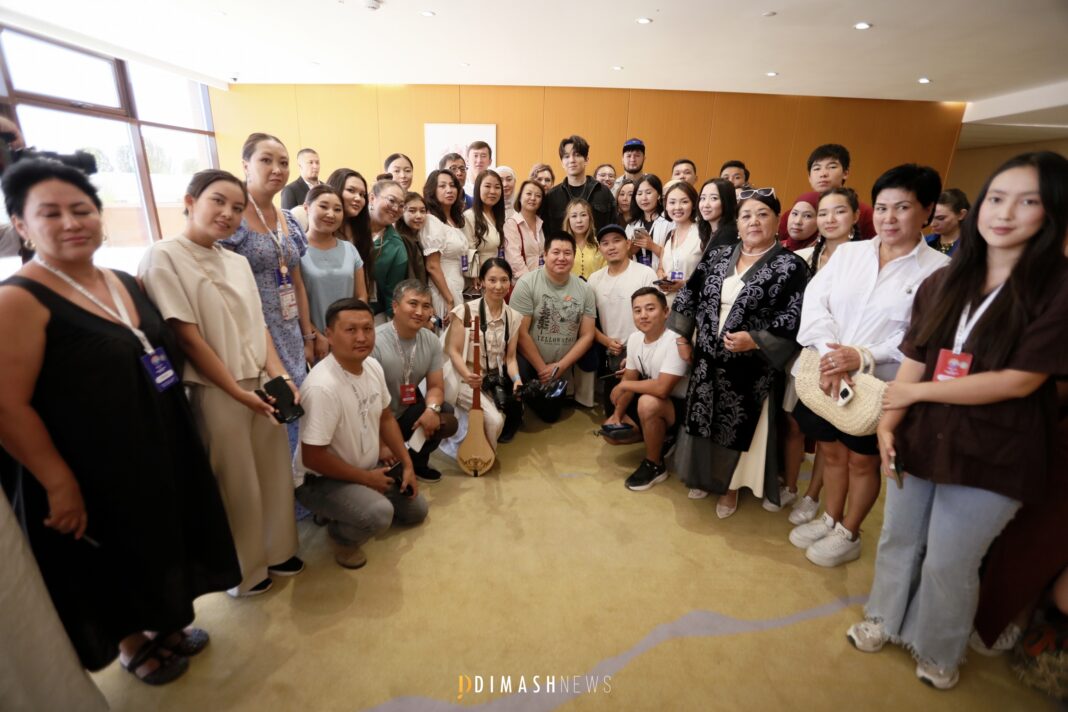
Dimash was also invited to perform at the World Nomad Games in Kyrgyzstan in 2026.
If the opportunity arises, I would gladly try to come. But as you know, I have managers in several countries, and everything depends on how they schedule my calendar. We would need to coordinate with them. But for me, it would be a great honor.
I wish you success. May the World Nomad Games be grand and beautiful. May Allah give you strength and energy. May your reputation continue to grow. Thank you.


